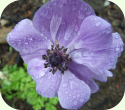Anemone
There are approximately 120 species of anemones.
Other Names: Windflower, Wood Anemone,
Wind-flower, Woodland Ghost,
Scientific Classification:
Kingdom: Plantae
Class: Magnoliopsida
Order: Ranunculales
Family: Ranunculaceae
Genus: Anemone
|
|

Anemone |
|
Descriptions: Flowering perennial known
for shallowly cupped flowers.
Size: Anenomes vary in size from dainty
species that stand only 6 inches to to towering
stems that can reach over 3 feet.
Symbolism: An ancient Greek myth says
that the anemone flower sprang from the tears
of Aphrodite, as she mourned the death of Adonis.
The anemone is thought to bring luck, it will
also protect against evil. Other myths tie the
anemone to magical fairies who slept under the
flower's petals after they closed. anemones are
also said to represent anticipation. Egyptians
held the belief that Anemones symbolized sickness.
Grow Details:
Grow Details
Soil Type: Drained,
Loose Soil
Soil PH: PH of 5.6 to 7.8 is preferred
Water: Standard watering guidelines
apply
Light: Partial Shade, Partial Sun,
or Full Sun
Grow Zone: Depending on the species
anemones will grow in zone 4 to 9, check
the exact species to see suggested grow
zone.
|
|
Characteristics
Height: Some species 6 to 18 inches,
others as much as 2 to 3 feet.
Flower Colors: White, pink, red,
scarlet, blue or purple.
Propagation: Can self-propagate in
the right conditions.
Division/Transplants: Varies
Blooming Period: Spring, Summer and
Autumn depending on species. There are three
types of anemone flowers. There is a Spring
flowering type, which has either rhizomes
or tubers. There is tuberous Mediterranean
which flowers in spring and summer. And
there is a larger Fall flowering type, which
blooms in late summer to fall and tends
to have fibrous roots.
|
Type: Perennials
Herbal Remedy Properties: The Anemone
is poisonous if ingested, however herbalists have
in the past used anemones for headaches, gout,
rheumatism, cramps, and other distressing aches.
Native Area: Anemones grow wild in many
European countries. anemones are also found in
North America, and Japan.
Other: Botanists describe the anemone
as a natural barometer, because as night approaches,
or just before a rain shower, the petals of an
anemone will close.
|
